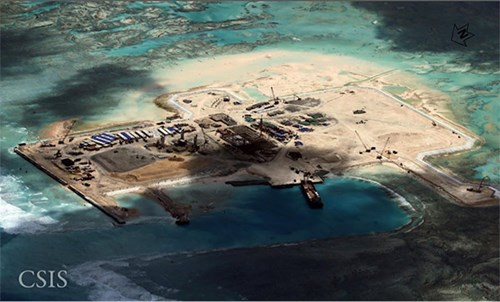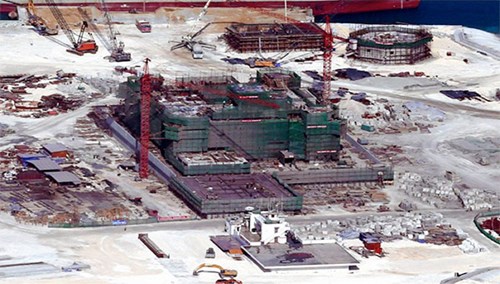|
Does China's
military buildup harm anyone?
“China
strengthening national defense aims at defense. It is very normal, which does
not bring harm to neighboring countries or the world,” a Chinese scholar has
said.
VietNamNet Bridge would like to
introduce several articles written by Hoang Huong during her trip to Hawaii
(USA), Beijing and Hainan (China), Masinloc and Manila (the Philippines) and
Singapore with journalists from 14 countries in the Asia-Pacific region to
discuss the East Sea (South China Sea) conflict, held by the Jefferson
Fellowship program of the East-West Center (USA).
The three scholars mentioned in the
article are Dr. Mr. Denny Roy, a senior expert on governance and security
from the East-West Center (USA), Prof. Sherry P. Broder, a lecturer at the
William S. Richardson Law School, University of Hawaii (USA) and Dr. Li
Guoqiang, a researcher in the field of philosophy and social sciences from
the Chinese Academy of Social Sciences.
US
scholar: China
will be more aggressive
|
|
|
Satellite
image of the reef of Cuarteron taken last November. Photo: CSIS
|
In late April, the US Department of
Defense announced the annual military report. A main part of the report was
on China, focusing on two
issues: China’s activities
in the East Sea
(South China Sea) and its increasing
investment in the military.
According to the report, in 2014 China
announced a 9.3% rise in the defense budget, bringing the total figure to
$136 billion. On average, China
increased the defense budget by 9.5% per year for the period from 2005 to
2014, mainly in the purchase of foreign weapons, equipment, research and
development.
Along the increase in speed and
scale of construction in the East Sea and continuous acts of aggression, China has
worried the international community. However Mr. Li Guoqiang said: "China
strengthening national defense aims at defense. It is very normal, which does
not bring harm to the neighboring countries or the world.”
The Chinese scholar argued that so
far China "is a
country of defensive nature" because of "China’s geographical location and
structure and the Chinese traditional culture", leading to the conclusion
that "military development of a country is very normal thing, providing
that it does not bring harm to neighboring countries or the world."
From the US
perspective, Dr. Denny Roy said that China may become militarily more
aggressive than it is now. This would affect China’s relationships with its
neighbors.
“China is already highly
influential because of its economic power. This matters more than legitimacy.
Look, for example, at how quickly countries such as Britain joined the
China-sponsored AIIB even though many Britons are in principle opposed to
some practices of the Chinese Communist Party,” he said.
Agreeing with Dr. Roy, Prof. Sherry
said that China
is a leading world country. It has expanded its economic power through access
to its markets, capital, and resources and has attracted $2 trillion of
foreign direct investment. Its economy ranks first in the world in building
modern infrastructure and global exports ($2.2 trillion). Its rate of
economic growth in the last 30 years has been phenomenal. By 2025, it is
predicted to have the world’s largest gross national product.
According to Prof. Sherry, the US
Department of Defense has submitted a “Military and Security Developments
Involving the People’s Republic of China 2015” to the US Congress.
It reported that China
is engaged in a “long-term, comprehensive military modernization program
designed to improve the capacity of its armed forces to fight and win
short-duration, high-intensity regional contingencies. "This is very
worrying," she said.
Is China building artificial islands
for community purposes?
|
|
|
China’s illegal
works on the reef of Cuarteron in Vietnam’s Truong Sa
Archipelago. Photo: Asahi Shimbun
|
Chinese scholar Li Guoqiang said: “China does
not take action to expand islands". We must see what is the purpose of
island construction, whether it is occupation or to serve the community”. He
added that "China is
not judged in a fair way" because "China
has begun implementing a number of development activities of islands since
2002 while in over ten years, other countries have done a lot more than China".
Prof. Sherry said that recently China started a vigorous program of
reclamation at five of its outposts in Truong Sa (Spratly Islands).
“China
has already moved ahead and embarked on infrastructure projects. These
reclaimed areas do not provide China
with any additional legal rights to claim maritime territory within the South China Sea. However they are very significant
because they could provide China
with physical locations in the Spratly
Islands for harbors,
communications and surveillance systems, and probably at least one airfield.”
“China will be able to use them as
bases of operation for their paramilitary forces, including fishing vessels,
commercial ships and coast guard, as well as its naval fleet and also
increase its presence in the disputed area and allow for longer patrols,” she
said.
Predictions about developments in
the East Sea
Anticipating future developments in
the East Sea, the Chinese scholar used the word
"explosive depository", while the two American scholars mentioned
"rebalancing of power" and "threat of dominance".
Li Guoqiang said that countries in
this region, not only China,
will continue to strengthen the armed forces. The possibility of large-scale
conflict in the East
Sea is declining, but
the other points of the "explosive depository” could break out.
Prof. Sherry said that President
Obama has stated that American foreign policy is committed to a rebalancing
towards the Asia Pacific and that a key component of the rebalancing strategy
is the strengthening of U.S.-China relations.
“President Obama has traveled again
and again to Asia. He has hosted many Asian
leaders, including visits and planned visits from Prime Minister Abe of Japan, President Park of Korea, President
Jokowi of Indonesia, and
President Xi Jinping of China.
In 2015, President Obama, who visited the region twice last year, is going or
has gone back. The importance of cooperation and agreement to the US is shown
by this incredible amount of high-level engagement,” she said.
Dr. Denny Roy said: “I hope for a
collective solution but I think it is unlikely. The main reason is that
China
has no incentive to compromise. The trends suggest China will win in the end, so China’s goal
is to force the other claimants to give up their losing battle.”
“China is the region’s main
trading partner. It is also, however, a threat to dominate the region.
It could be to the advantage of the region if China
and the United States
peacefully compete for the loyalty of Southeast Asian countries,” he said.
Hoang Huong,
VNN
|


Không có nhận xét nào:
Đăng nhận xét